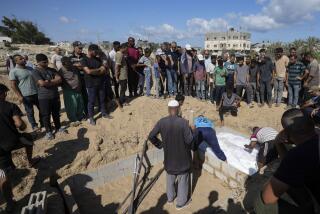UPHEAVAL IN ROMANIA : Romanians Find Bodies in Mass Graves : Massacre: Residents in center of protest district say between 2,000 and 4,500 people were slain by dreaded security forces.
- Share via
TIMISOARA, Romania — Hundreds of people Friday were digging up mass graves discovered in the forest district of Timisoara, trying to find the remains of their friends and relatives killed in last weekend’s crackdown.
Residents said that between 2,000 to 4,500 people were massacred by the dreaded security forces since Sunday and Monday to try to stop protests in Romania. The bodies are believed to be in three mass graves. There was no independent confirmation of the number of dead.
The Hungarian news agency MTI reported that two mass graves containing 632 bodies had been found outside Timisoara.
Timisoara, 500 miles from Bucharest near the Yugoslav and Hungarian border, was the center of protests that were brutally suppressed by the regime of President Nicolae Ceausescu, who was toppled Thursday.
West German television, with film provided by Romanian television, showed footage of rows of unearthed bodies. The muddied, naked corpses were shown being dug out and placed on white sheets, one after the other. Grieving townspeople placed candles around the bodies.
Barbed wire bound some of the bodies of men, women and children. The body of one small child lay on top of an adult corpse.
“Not even Hitler killed his own children, and here they used automatic machine gun bursts to strafe them down,” said Slavomir Gvozdenovic, editor of a literary review in Timisoara.
Vasile Todorescu, an electrician, said he was trying to find his 20-year-old son, who disappeared during the unrest.
He said the corpses had been transported by garbage trucks to the area and the drivers were later shot by the police so no witnesses would be left.
Sorin Oprea, head of the Democratic Front of Romania, said his group does not recognize the new national leadership being set up in Bucharest.
“We want all Romanian citizens to elect the country’s new leadership,” Oprea said. “In Bucharest, they only fought for two days while our struggle was much longer.”
Oprea, 37, was interviewed at the downtown opera house that is being used as the headquarters of the provisional municipal leadership.
People approaching the opera house were being searched by plainclothes volunteers, some of whom were armed with automatic rifles.
The people’s militia, as the volunteers call themselves, captured their weapons from troops during the weekend fighting, they said.
More to Read
Sign up for Essential California
The most important California stories and recommendations in your inbox every morning.
You may occasionally receive promotional content from the Los Angeles Times.










